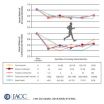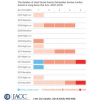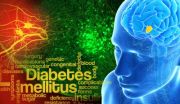(Press-News.org) Running for only a few minutes a day or at slow speeds may significantly reduce a person's risk of death from cardiovascular disease compared to someone who does not run, according to a study published today in the Journal of the American College of Cardiology.
Exercise is well-established as way to prevent heart disease and it is component of an overall healthy life, but it is unclear whether there are health benefits below the level of 75 minutes per week of vigorous-intensity activity, such as running, recommended by the U.S. government and World Health Organization.
Researchers studied 55,137 adults between the ages of 18 and 100 over a 15-year period to determine whether there is a relationship between running and longevity. Data was drawn from the Aerobics Center Longitudinal Study, where participants were asked to complete a questionnaire about their running habits. In the study period, 3,413 participants died, including 1,217 whose deaths were related to cardiovascular disease. In this population, 24 percent of the participants reported running as part of their leisure-time exercise.
Compared with non-runners, the runners had a 30 percent lower risk of death from all causes and a 45 percent lower risk of death from heart disease or stroke. Runners on average lived three years longer compared to non-runners. Also, to reduce mortality risk at a population level from a public health perspective, the authors concluded that promoting running is as important as preventing smoking, obesity or hypertension. The benefits were the same no matter how long, far, frequently or fast participants reported running. Benefits were also the same regardless of sex, age, body mass index, health conditions, smoking status or alcohol use.
The study showed that participants who ran less than 51 minutes, fewer than 6 miles, slower than 6 miles per hour, or only one to two times per week had a lower risk of dying compared to those who did not run.
DC (Duck-chul) Lee, Ph.D., lead author of the study and an assistant professor in the Iowa State University Kinesiology Department in Ames, Iowa, said they found that runners who ran less than an hour per week have the same mortality benefits compared to runners who ran more than three hours per week. Thus, it is possible that the more may not be the better in relation to running and longevity.
Researchers also looked at running behavior patterns and found that those who persistently ran over a period of six years on average had the most significant benefits, with a 29 percent lower risk of death for any reason and 50 percent lower risk of death from heart disease or stroke.
"Since time is one of the strongest barriers to participate in physical activity, the study may motivate more people to start running and continue to run as an attainable health goal for mortality benefits," Lee said. "Running may be a better exercise option than more moderate intensity exercises for healthy but sedentary people since it produces similar, if not greater, mortality benefits in five to 10 minutes compared to the 15 to 20 minutes per day of moderate intensity activity that many find too time consuming."
INFORMATION:
The American College of Cardiology is a 47,000-member medical society that is the professional home for the entire cardiovascular care team. The mission of the College is to transform cardiovascular care and to improve heart health. The ACC leads in the formation of health policy, standards and guidelines. The College operates national registries to measure and improve care, provides professional medical education, disseminates cardiovascular research and bestows credentials upon cardiovascular specialists who meet stringent qualifications. For more information, visit Cardiosource.org/ACC
Running reduces risk of death regardless of duration, speed
Running 5 minutes daily can reduce risk of cardiovascular disease-related death
2014-07-28
ELSE PRESS RELEASES FROM THIS DATE:
Endurance runners more likely to die of heat stroke than heart condition
2014-07-28
Heat stroke is 10 times more likely than cardiac events to be life-threatening for runners during endurance races in warm climates, according to a study published today in the Journal of the American College of Cardiology. The authors noted the findings may play a role in the ongoing debate over pre-participation ECG screenings for preventing sudden death in athletes by offering a new perspective on the greatest health risk for runners.
Two of the most recognized causes of sudden death during an endurance race are arrhythmic death, sudden death usually caused by undetected ...
Learning the smell of fear: Mothers teach babies their own fears via odor, research finds
2014-07-28
ANN ARBOR, Mich. — Babies can learn what to fear in the first days of life just by smelling the odor of their distressed mothers, new research suggests. And not just "natural" fears: If a mother experienced something before pregnancy that made her fear something specific, her baby will quickly learn to fear it too -- through the odor she gives off when she feels fear.
In the first direct observation of this kind of fear transmission, a team of University of Michigan Medical School and New York University studied mother rats who had learned to fear the smell of peppermint ...
New study confirms water vapor as global warming amplifier
2014-07-28
MIAMI – A new study from scientists at the University of Miami Rosenstiel School of Marine and Atmospheric Science and colleagues confirms rising levels of water vapor in the upper troposphere – a key amplifier of global warming – will intensify climate change impacts over the next decades. The new study is the first to show that increased water vapor concentrations in the atmosphere are a direct result of human activities.
"The study is the first to confirm that human activities have increased water vapor in the upper troposphere," said Brian Soden, professor of atmospheric ...
Impact of Deepwater Horizon oil spill on coral is deeper and broader than predicted
2014-07-28
A new discovery of two additional coral communities showing signs of damage from the Deepwater Horizon oil spill expands the impact footprint of the 2010 spill in the Gulf of Mexico. The discovery was made by a team led by Charles Fisher, professor of biology at Penn State University. A paper describing this work and additional impacts of human activity on corals in the Gulf of Mexico will be published during the last week of July 2014 in the online Early Edition of the journal Proceedings of the National Academy of Sciences.
"The footprint of the impact of the spill ...
The bit of your brain that signals how bad things could be
2014-07-28
An evolutionarily ancient and tiny part of the brain tracks expectations about nasty events, finds new UCL research.
The study, published in Proceedings of the National Academy of Sciences, demonstrates for the first time that the human habenula, half the size of a pea, tracks predictions about negative events, like painful electric shocks, suggesting a role in learning from bad experiences.
Brain scans from 23 healthy volunteers showed that the habenula activates in response to pictures associated with painful electric shocks, with the opposite occurring for pictures ...
Cell's recycling center implicated in division decisions
2014-07-28
Most cells do not divide unless there is enough oxygen present to support their offspring, but certain cancer cells and other cell types circumvent this rule. Researchers at The Johns Hopkins University have now identified a mechanism that overrides the cells' warning signals, enabling cancers to continue to divide even without a robust blood supply. In the process, the researchers found that lysosomes — the cell's protein "recycling centers" — help govern cell division decisions. They also uncovered new evidence that certain drugs can halt the growth of tumors that have ...
Facial features are the key to first impressions
2014-07-28
A new study by researchers in the Department of Psychology at the University of York shows that it is possible to accurately predict first impressions using measurements of physical features in everyday images of faces, such as those found on social media.
When we look at a picture of a face we rapidly form judgements about a person's character, for example whether they are friendly, trustworthy or competent. Even though it is not clear how accurate they are, these first impressions can influence our subsequent behaviour (for example, judgements of competence based on ...
Scripps Florida scientists find genetic mutations linked to salivary gland tumors
2014-07-28
JUPITER, FL - July 28, 2014 – Research conducted at the Florida campus of The Scripps Research Institute (TSRI) has discovered links between a set of genes known to promote tumor growth and mucoepidermoid carcinoma, an oral cancer that affects the salivary glands. The discovery could help physicians develop new treatments that target the cancer's underlying genetic causes.
The research, recently published online ahead of print by the Proceedings of the National Academy of Sciences, shows that a pair of proteins joined together by a genetic mutation—known as CRTC1/MAML2 ...
Glucose 'control switch' in the brain key to both types of diabetes
2014-07-28
Researchers at Yale School of Medicine have pinpointed a mechanism in part of the brain that is key to sensing glucose levels in the blood, linking it to both type 1 and type 2 diabetes. The findings are published in the July 28 issue of Proceedings of the National Academies of Sciences.
"We've discovered that the prolyl endopeptidase enzyme — located in a part of the hypothalamus known as the ventromedial nucleus — sets a series of steps in motion that control glucose levels in the blood," said lead author Sabrina Diano, professor in the Departments of Obstetrics, Gynecology ...
Physicists unlock nature of high-temperature superconductivity
2014-07-28
Physicists have identified the "quantum glue" that underlies a promising type of superconductivity -- a crucial step towards the creation of energy superhighways that conduct electricity without current loss.
The research, published online in the Proceedings of the National Academy of Sciences, is a collaboration between theoretical physicists led by Dirk Morr, professor of physics at the University of Illinois at Chicago, and experimentalists led by Seamus J.C. Davis of Cornell University and Brookhaven National Laboratory.
The earliest superconducting materials required ...
LAST 30 PRESS RELEASES:
New knowledge on heritability paves the way for better treatment of people with chronic inflammatory bowel disease
Under the Lens: Microbiologists Nicola Holden and Gil Domingue weigh in on the raw milk debate
Science reveals why you can’t resist a snack – even when you’re full
Kidney cancer study finds belzutifan plus pembrolizumab post-surgery helps patients at high risk for relapse stay cancer-free longer
Alkali cation effects in electrochemical carbon dioxide reduction
Test platforms for charging wireless cars now fit on a bench
$3 million NIH grant funds national study of Medicare Advantage’s benefit expansion into social supports
Amplified Sciences achieves CAP accreditation for cutting-edge diagnostic lab
Fred Hutch announces 12 recipients of the annual Harold M. Weintraub Graduate Student Award
Native forest litter helps rebuild soil life in post-mining landscapes
Mountain soils in arid regions may emit more greenhouse gas as climate shifts, new study finds
Pairing biochar with other soil amendments could unlock stronger gains in soil health
Why do we get a skip in our step when we’re happy? Thank dopamine
UC Irvine scientists uncover cellular mechanism behind muscle repair
Platform to map living brain noninvasively takes next big step
Stress-testing the Cascadia Subduction Zone reveals variability that could impact how earthquakes spread
We may be underestimating the true carbon cost of northern wildfires
Blood test predicts which bladder cancer patients may safely skip surgery
Kennesaw State's Vijay Anand honored as National Academy of Inventors Senior Member
Recovery from whaling reveals the role of age in Humpback reproduction
Can the canny tick help prevent disease like MS and cancer?
Newcomer children show lower rates of emergency department use for non‑urgent conditions, study finds
Cognitive and neuropsychiatric function in former American football players
From trash to climate tech: rubber gloves find new life as carbon capturers materials
A step towards needed treatments for hantaviruses in new molecular map
Boys are more motivated, while girls are more compassionate?
Study identifies opposing roles for IL6 and IL6R in long-term mortality
AI accurately spots medical disorder from privacy-conscious hand images
Transient Pauli blocking for broadband ultrafast optical switching
Political polarization can spur CO2 emissions, stymie climate action
[Press-News.org] Running reduces risk of death regardless of duration, speedRunning 5 minutes daily can reduce risk of cardiovascular disease-related death






